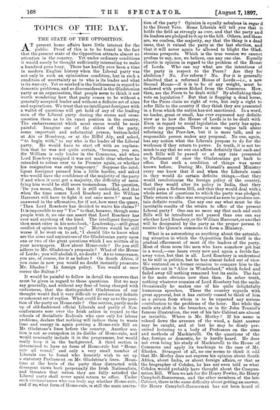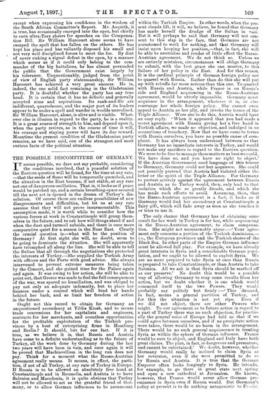TOPICS OF THE DAY.
THE STATE OF THE OPPOSITION.
AT present home affairs have little interest for the public. Proof of this is to be found in the fact that the present state of the Opposition attracts almost no attention in the country. Yet under ordinary conditions it would surely be thought sufficiently interesting to make a hundred pens busy. There has hardly ever been a time in modern English history when the Liberal party was not only in such an opinionless condition, but in such a condition of uncertainty as to who is its leader and what is its war-cry. Yet so marked is the listlessness in regard to domestic problems, and so disconsidered is the Gladstonian party as an organisation, that people seem to think it not worth wondering how that party comes to be without a generally accepted leader and without a definite set of aims and aspirations. We trust that no intelligent foreigner with a wallet of questions will get hold of any of the leading men of the Liberal party during the recess and cross- question them as to its exact position in the country. The embarrassment which must ensue would be most painful. Imagine one of the elders of the party, some important and substantial person, button-holed at Aix or Homburg, or at the Rife! Alp, and asked, "to begin with," to say who is the leader of the Liberal party. He would have to start off with an explana- tion that he was not quite certain, l because, you see, Sir William is only leader in the Commons, and when Lord Rosebery resigned it was not made clear whether he intended to refuse ever to be Premier again, or whether his resignation was only temporary.' Suppose the intel- ligent foreigner pressed him a little harder, and asked who would have the confidence of the majority of the party if and when it next got a majority, the difficulty of satis- fying him would be still more tremendous. The question, 'Do you mean, then, that it is still undecided, and that when the time comes Lord Rosebery and Sir William Harcourt will have to fight it out once more ? ' must be answered in the affirmative, for if not, how meet the query, Then Lord Rosebery has decided to waive his claims ? ' It is impossible to say " Yes " to that, because, though some people wish it, no one can assert that Lord Rosebery has ever said anything of the kind. The intelligent foreigner then must enter in his note-book, ' Leadership,—still great conflict of opinion in regard to.' Matters would be still worse if he went on to ask, I should like to know what are the aims and aspirations of the G-ladstonian party upon one or two of the great questions which I see written of in your newspapers. How about Home-rule ? Do you still adhere to Mr. Gladstone's proposals ? What of the House of Lords ; you will abolish it, no doubt ? As to temperance, you are, of course, for it as before ? On South Africa, if you came in now you would no doubt instantly prosecute Mr. Rhodes ? In foreign policy. You would at once coerce the Sultan ? '
It would be painful to follow in detail the answers that must be given in regard to these questions. But we may say generally, and without any fear of being charged with unfairness, that the distinguished Gladstonian of our thought would find it very difficult to produce any definite or coherent set of replies. What could he say as to the posi- tion of the party on Home-rule ? One section, partly made up of old-fashioned official Liberals and partly of Non- conformists sore over the Irish action in regard to the schools of Socialistic Radicals who care only for labour problems, declare that nothing will induce them to waste time and energy in again putting a Home-rule Bill on Mr. Gladstone's lines before the country. Another sec- tion is not so outspoken in its dislike of Home-rule, and would nominally include it in the programme, but would really keep it in the background. A third section is determined to have no form of Home-rule but " Home- rule all round," and only a very small number of Liberals can be found who honestly wish to set up a statutory Parliament on Mr. Gladstone's lines. Mean- time at the heels of the party thus distracted with divergent views bark perpetually the Irish Nationalists, and threaten that unless they are fully satisfied the Liberal party shall never again return to office. Under such circumstances who can truly say whether Home-rule, and if so, what form of Home-rule, is still the main aspira- tion of the party ? Opinion is equally nebulous in regard to the Direct Veto. Some Liberals will tell you that it holds the field as strongly as ever, and that the party and its leaders are pledged to it up to the hilt. Others, and these are, we confess, the majority, say that the thing is a dead issue, that it ruined the party at the last election, and that it will never again be allowed to blight the Glad- stonian prospects. Which is the true version we cannot profess to say, nor, we believe, can any one else. Equally chaotic is opinion in regard to the problem of the House of Lords. Who can say what are the intentions of the party in respect to the Peers ? Are they for abolition ? No. For reform ? No. For it is generally admitted that a reformed House of Lords—i.e., a new Second House—if it is to be of any weight, must be endowed with powers filched from the Commons. How,. then, are the Peers to be dealt with? By abolishing their veto on legislation ? But that is flogging a dead horse, for the Peers claim no right of veto, but only a right to refer Bills to the country if they think they are presented in a form which the nation has not sanctioned. In a word, no leader, great or small, has ever expressed any definite view as to how the House of Lords is to be dealt with. Even in regard to social legislation the party has appa- rently no proposals. There is some vague talk about reforming the Poor-law, but it is mere talk, and no responsible person makes any proposal. No one, again, has any notion what the Liberals propose to do for the workmen if they return to power. In truth, it is not too much to say that no one can affirm definitely that such and such Bills will be passed or at any rate presented to Parliament if once the Gladstonians get back to office. But such a condition of things was never known before. During Mr. Disraeli's second Ministry every one knew that if and when the Liberals came in they would do certain definite things,—that they would revolutionise the foreign policy of the country, that they would alter its policy in India, that they would pass a Reform Bill, and that they would deal with a whole series of questions to which the party was pledged. Their return to office was recognised as sure to produce cer- tain definite results. Can any one say what must be the inevitable results of the return to office of the present Liberal party One can no more say that such and such Bills will be introduced and passed than one can say whether Lord Rosebery, or Sir William Harcourt, or another will be designated by the party as the proper person to receive the Queen's summons to form a Ministry.
What is as astonishing as anything about the astonish- ing situation in which the Opposition finds itself is the gradual effacement of most of the leaders of the party. Most of them seem like men who have somehow got lost in a wood,—one hears every now and again a feeble far- away voice, but that is all. Lord Rosebery is understood to be still in politics, but he has almost faded out of view. We ventured on a former occasion to compare him to the Cheshire cat in "Alice in Wonderland," which faded and faded away till nothing remained but its smile. The fact is far more obvious now than then. In sober truth, nothing whatever remains of Lord Rosebery but the smile. Occasionally he makes one of his quite delightfully humorous speeches. These the country regards with great approval, but it has entirely ceased to think of him as a person from whom is to be expected any serious contribution to the problems of the hour. But while the smile sits aloft in the branches, as in Sir John Tenniel's famous illustration, the rest of his late Cabinet are almost as invisible. Where is Mr. Morley ? If his name is echoed down the avenues of the wood, a faint answer may be caught, and at last he may be dimly per- ceived lecturing to a body of Professors on the aims and methods of Machiavelli. On the questions of the day, foreign or domestic, he is hardly heard. He does not even bring his study of Machiavelli to the House of Commons and apply its teachings to the case of Mr. Rhodes. Strangest of all, no one seems to think it odd that Mr. Morley does not express his opinion about South Africa, about India, or about foreign affairs, or that as the biographer of Cobden, he has not even told us what Cobden would probably have thought about the Compen- sation Bill. When we ask for Sir Henry Fowler, Sir Henry Campbell-Bannerman, and the other members of the late Cabinet, there is the same difficulty about getting an answer. Sir Henry Campbell-Bannerman has not been heard of except when expressing his confidence in the wisdom of the South African Committee's Report. Mr. Asquith, it is true, has occasionally emerged into the open, but chiefly to earn ultra-Tory cheers for speeches on the Compensa- tion Bill. Sir William Harcourt alone seems to have escaped the spell that has fallen on the others. He has kept his place and has valiantly disposed his small and not very well disciplined forces to meet the foe. By dint of never risking a. signal defeat in the open, by a, manner which seems as if it could only belong to the com- mander of the big battalions, he has almost persuaded the public that the Government exist largely by his tolerance. Unquestionably, judged from the point of view of English party statesmanship, Sir William Harcourt has achieved a very great success. He is, indeed, the one solid fact remaining in the Gladstonian party. It is doubtful whether the party has any true head. It is certain that it has no definite and generally accepted aims and aspirations. Its rank-and-file are indifferent, quarrelsome, and the major part of its leaders appear to be under a spell and wander in worlds unrealised. Sir William Harcourt, alone, is alive and is visible. What- ever else is illusion in regard to the party, he is a reality. It is a great source of strength to him, and depend upon it, when the party revives, as in the course of time it will, his courage and staying power will have its due reward. Meantime the present condition of the Gladstonian party remains, as we have said, one of the strangest and most curious facts of the political situation.



































 Previous page
Previous page